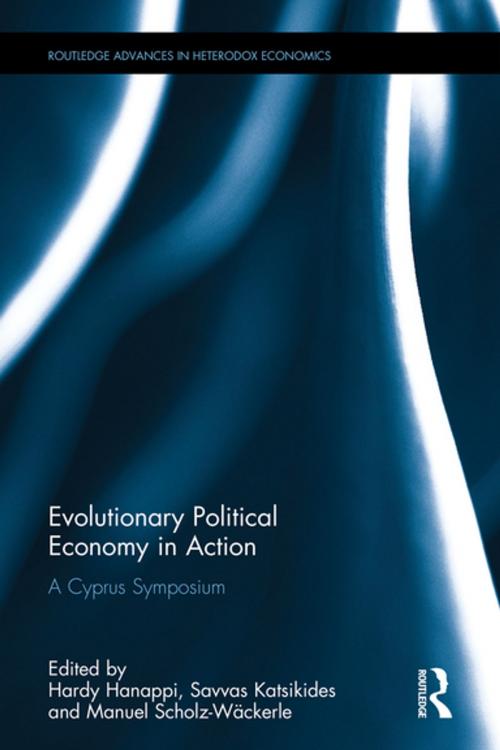Evolutionary Political Economy in Action
A Cyprus Symposium
Business & Finance, Economics, Theory of Economics| Author: | ISBN: | 9781315470115 | |
| Publisher: | Taylor and Francis | Publication: | January 6, 2017 |
| Imprint: | Routledge | Language: | English |
| Author: | |
| ISBN: | 9781315470115 |
| Publisher: | Taylor and Francis |
| Publication: | January 6, 2017 |
| Imprint: | Routledge |
| Language: | English |
The world is in turmoil, the dynamics of political economy seem to have entered a phase where a ‘return to normal’ cannot be expected. Since the financial crisis, conventional economic theory has proven itself to be rather helpless and political decision makers have become suspicious about this type of economic consultancy. This book offers a different approach. It promises to describe political and economic dynamics as interwoven as they are in real life and it adds to that an evolutionary perspective. The latter allows for a long-run view, which makes it possible to discuss the emergence and exit of social institutions.
Evolutionary Political Economy in Action consists of two parts. Part I provides a broad range of issues that show how flexible evolutionary political economy can handle acute policy problems in Europe: should Europe support the revived build-up of NATO forces on its Eastern border, or should it rather aim at economic cooperation with Russia? How can democracy for a whole continent be reasonably further developed; what is the role of economies of scope? Do the new protest movements against inequality provide alternatives? What could a vision for a unified, socioecological Europe look like? Part II takes a closer look at Cyprus and Greece, where the problems of the financial crisis have been exacerbated by the ‘solutions’ imposed on them by the troika. In all of these essays, the authors demonstrate the unique insights which can be garnered from adopting an evolutionary political economy approach and consider the real solutions that such an approach points towards.
This volume is extremely useful for social scientists in the fields of economics, politics and sociology who are interested to learn what evolutionary political economy is, how it proceeds and what it can provide.
The world is in turmoil, the dynamics of political economy seem to have entered a phase where a ‘return to normal’ cannot be expected. Since the financial crisis, conventional economic theory has proven itself to be rather helpless and political decision makers have become suspicious about this type of economic consultancy. This book offers a different approach. It promises to describe political and economic dynamics as interwoven as they are in real life and it adds to that an evolutionary perspective. The latter allows for a long-run view, which makes it possible to discuss the emergence and exit of social institutions.
Evolutionary Political Economy in Action consists of two parts. Part I provides a broad range of issues that show how flexible evolutionary political economy can handle acute policy problems in Europe: should Europe support the revived build-up of NATO forces on its Eastern border, or should it rather aim at economic cooperation with Russia? How can democracy for a whole continent be reasonably further developed; what is the role of economies of scope? Do the new protest movements against inequality provide alternatives? What could a vision for a unified, socioecological Europe look like? Part II takes a closer look at Cyprus and Greece, where the problems of the financial crisis have been exacerbated by the ‘solutions’ imposed on them by the troika. In all of these essays, the authors demonstrate the unique insights which can be garnered from adopting an evolutionary political economy approach and consider the real solutions that such an approach points towards.
This volume is extremely useful for social scientists in the fields of economics, politics and sociology who are interested to learn what evolutionary political economy is, how it proceeds and what it can provide.















